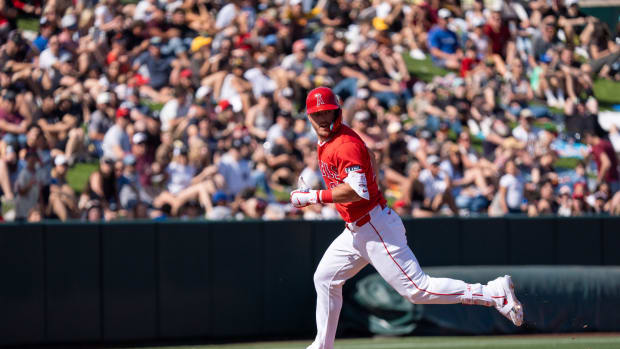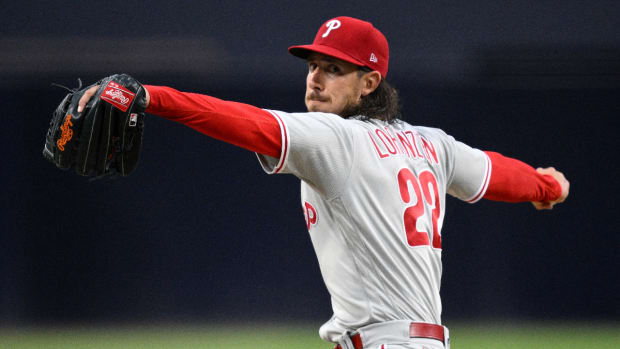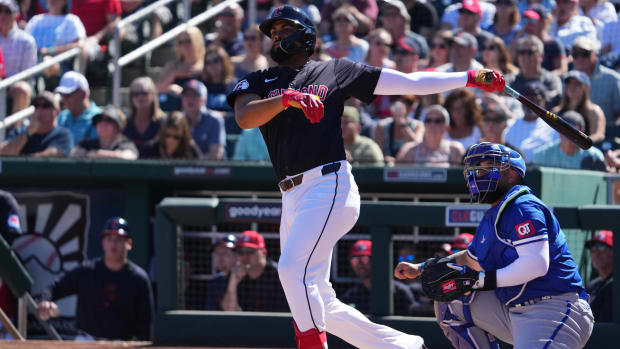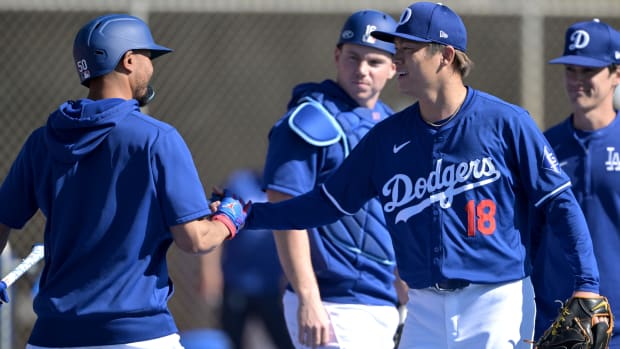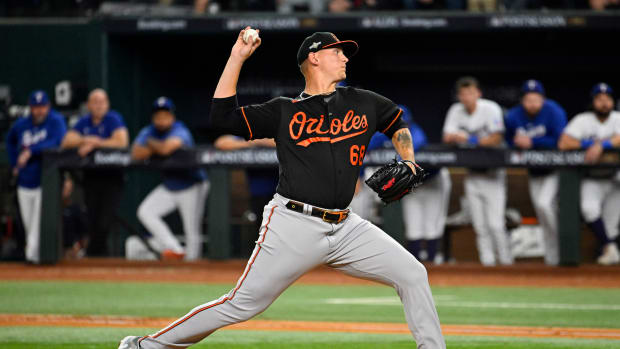Greinke falls short in bold challenge to Hershiser's scoreless innings streak
NEW YORK — Zack Greinke's good fortune finally ran out on Sunday, as his 45 2/3 inning scoreless streak—the sixth-longest in major league history—came to an end via a series of bad breaks. The combination of a hit-by-pitch, a bobble by a sure-handed centerfielder and a fielder's choice off the bat of the opposing pitcher that produced a close play at the plate enabled the Mets to scratch out the first run against the 31-year-old righty since his eighth and final inning against the Padres on June 13. The Dodgers ultimately fell to the Mets in 10 innings, 3–2.
Greinke had totaled six scoreless starts since his last run, lowering his ERA to a Bob Gibson-esque 1.30, though he did yield a leadoff home run to Mike Trout while starting for the National League in the All-Star Game on July 14. Originally scheduled to start against the Mets on Friday, his turn was pushed back when he flew home to Los Angeles for the birth of his son on Thursday evening.
The streak-ending run, the first of two that Greinke allowed in seven innings of work, appeared to be inevitable after he put runners on first and third with nobody out in the third inning. After retiring the first six hitters he faced, he grazed Kirk Nieuwenhuis with a 93 mph fastball to start the frame. Nieuwenhuis then took third on a miscue by Joc Pederson while trying to field Kevin Plawecki’s single up the middle.
• TAYLER: MLB Hall of Fame welcomes ‘unique’ quartet
That brought up Jacob deGrom, not only an outstanding pitcher in his own right but an above-average hitter (.207/.225/.241 career) among that class as well. deGrom hit a chopper to first baseman Adrian Gonzalez, whose hurried throw to catcher Yasmani Grandal was too late to beat the sliding Nieuwenhuis:
The Dodgers briefly considered challenging umpire Manny Gonzalez's "safe" call, but did not. After the game, Grandal suggested that without the recently implemented rule preventing catchers from blocking the plate without possession of the ball, he would have been able to tag Nieuwenhuis in time.
"There's no way he's getting on the plate if the rule's not there," Grandal said. "But then again, it's a two-way street. The rule is there to make sure the runners don't get hurt, as well as the catchers."
#http://www.120sports.com/video/v138828364/mets-win-on-uribe-walkoff
Greinke was vying to break the record of another Dodger, Orel Hershiser, who ran off a 59-inning streak in 1988, the same year he led the Dodgers to their most recent championship. He also won the NL Cy Young, the NLCS and World Series MVP and Sports Illustrated Sportsman of the Year along the way. In a pleasant bit of serendipity, Hershiser is now one of the Dodgers' broadcasters, just as the man whose record he broke—Don Drysdale, who threw 58 scoreless innings in 1968—was when he was piling up the zeroes. On Saturday, Hershiser expressed excitement over the possibility of his record falling, telling The Orange County Register's Bill Plunkett, "I think it would be wonderful … It would be an amazing thing to watch and enjoy. And I would be even doubly proud if it was a Dodger (who broke his record)."
Via the Elias Sports Bureau, here are the 10 longest scoreless streaks:
rank | pitcher | team | innings pitched | dates |
1 | Orel Hershiser | Dodgers | 59 | Aug. 30–Sept. 28, 1988 |
2 | Don Drysdale | Dodgers | 58 | May 14–June 8, 1968 |
3 | Walter Johnson | Senators | 55 2/3 | April 10–May 14, 1913 |
4 | Jack Coombs | Athletics | 53 | Sept. 5–25, 1910 |
5 | Bob Gibson | Cardinals | 47 | June 2–26, 1968 |
6 | Zack Greinke | Dodgers | 45 2/3 | June 18–July 26, 2015 |
7 | Carl Hubbell | Giants | 45 1/3 | July 13–Aug. 1, 1933 |
T8 | Cy Young | Red Sox | 45 | April 25–May 17, 1904 |
| Doc White | White Sox | 45 | Sept. 12–30, 1904 |
| Sal Maglie | Giants | 45 | Aug. 16–Sept. 13, 1950 |
Unlike Hershiser and Drysdale, each of whom totaled six complete-game shutouts while piecing together their streaks, Greinke didn't go the distance once during his scoreless stretch, although that has far less to do with the quality of his performances than the evolution of the game, with higher scoring, more strikeouts, longer plate appearances, a heightened sensitivity to pitch counts and the near-disappearance of the complete game. In 1968, the lowest scoring year since the Deadball Era, NL teams scored 3.43 runs per game and pitchers completed 29% of their starts. In 1988, NL teams scored 3.88 runs per game and pitchers completed 14% of their starts, whereas NL teams came into Sunday scoring 3.98 runs per game, with pitchers completing just 1.6% of their starts. Greinke pitched eight innings in each of his last two starts, against the Phillies and Nationals, throwing a season-high 119 pitches against the latter on July 19. He threw 103 pitches over seven innings on Sunday before departing for a pinch-hitter.
Royals nab much-needed ace in Cueto, while Reds earn solid return
Greinke, who repeatedly downplayed the importance of the streak as it unfolded, said after the game that the disruption of his routine and the emotions in play weren't factors in his performance.
“Surprisingly, it wasn't as distracting as you'd think, flying back and forth across the country," he said. "I felt strong today. I started off doing really well and got worse. You'd think that if it affected me I'd have started off bad and gotten better."
That said, Greinke was not nearly as sharp as he's been in recent weeks. Though he only allowed four hits over his seven innings, his three strikeouts was his lowest total since he whiffed two on June 2 against the Rockies, while his three walks matched his season high, set back on April 24 against the Padres. The two batters he hit, Nieuwenhuis in the first and Michael Conforto in the sixth, which came with the bases loaded and forced in the game’s second run, marked the first time since the June 11, 2013 beanball war with the Diamondbacks that he plunked multiple hitters. During his streak, Greinke walked just four batters, hit one, and allowed 19 hits while striking out 43.
• MLB trade deadline tracker: Keep up with every move
With the two runs allowed, Greinke's ERA rose to a still-unfathomable 1.37. If he winds up anywhere in the vicinity of that mark, he’ll add a second Cy Young to his mantel to go with the 2009 award he won while with the Royals, particularly given that Max Scherzer, who Cliff Corcoran handicapped as the leader at the All-Star break, has given up five runs twice in his last four starts to push his ERA to 2.33. Meanwhile, deGrom, who held the Dodgers to a pair of singles and walked two while striking out eight over 7 2/3 stifling innings, lowered his ERA to 2.05, now good for second in the league.
Are Johnson, Martinez, Smoltz best pitching class ever at Hall of Fame?
deGrom yielded to closer Jeurys Familia, who in the ninth inning allowed the Dodgers to tie the game via back-to-back doubles by Gonzalez and Justin Turner and then a single by Grandal that scored pinch-runner Carl Crawford and led to extra innings. The Dodgers had a chance to take the lead in the 10th against Jenrry Mejia, but failed to capitalize after Jimmy Rollins reached third base with one out via a leadoff walk, a stolen base and a sacrifice bunt. The Mets won in the bottom of the 10th when Curtis Granderson hit a leadoff double and came home via a long single to left centerfield by Juan Uribe, who was traded on May 27 from the Dodgers to the Braves and then acquired from the Braves on Friday night, along with Kelly Johnson, for whom he pinch-hit in the eighth.
The walk-off win gave the two teams a split in the four-game series, helped along by the fact that the Dodgers had to summon spot starters for both Friday’s win (Ian Thomas) and Saturday’s loss (Zach Lee). The split left the Mets (51–48) two games behind the Nationals in the NL East race and 3 1/2 back in the Wild Card race. The Dodgers (56–44) lead the NL West by one game.
• Sports Illustrated's Baseball Hall of Fame Class of 2015 coverage
On the seemingly insurmountable record that Hershiser set, Greinke said, "I think everyone appreciates [what he did]. Maybe it will get broken. I know five years ago, I thought that one and the DiMaggio streak were the two toughest, but it looks like people are getting closer to the Hershiser one now."
Cole Hamels's no-hitter reaffirms his status as one of baseball's best
Indeed, nobody has seriously challenged Joe DiMaggio's 56-game hitting streak, set in 1941. The longest since then was Pete Rose's NL record-tying 44-game streak in 1978, with Paul Molitor's 39-gamer in 1987 and Jimmy Rollins's 36-gamer in 2007 the only ones even approaching that. By comparison, Greinke was within a two-start range of catching Drysdale, as was teammate Clayton Kershaw when he reeled off a 41-inning streak from June 13 to July 10 last year, the longest since Brandon Webb went 42 innings without allowing a run in 2007.
Kershaw, who has won three Cy Young awards in the past four seasons but struggled earlier this year, is now riding a 29-inning scoreless streak; he last allowed a run in the fourth inning of his July 3 start against the Mets, whom he thoroughly dominated in Thursday's series opener, taking a perfect game into the seventh inning and finishing a with a three-hit shutout. Greinke expressed his belief that his teammate could continue to build that streak. Grandal, meanwhile, seemed determined to point Greinke towards another streak.
“As soon as the run scored, I went out there and said, ‘We had a good run, let's just start another one,’” Grandal said.
Greinke would allow another run before the afternoon was through, but hey, he’s one inning into his next scoreless streak.






























